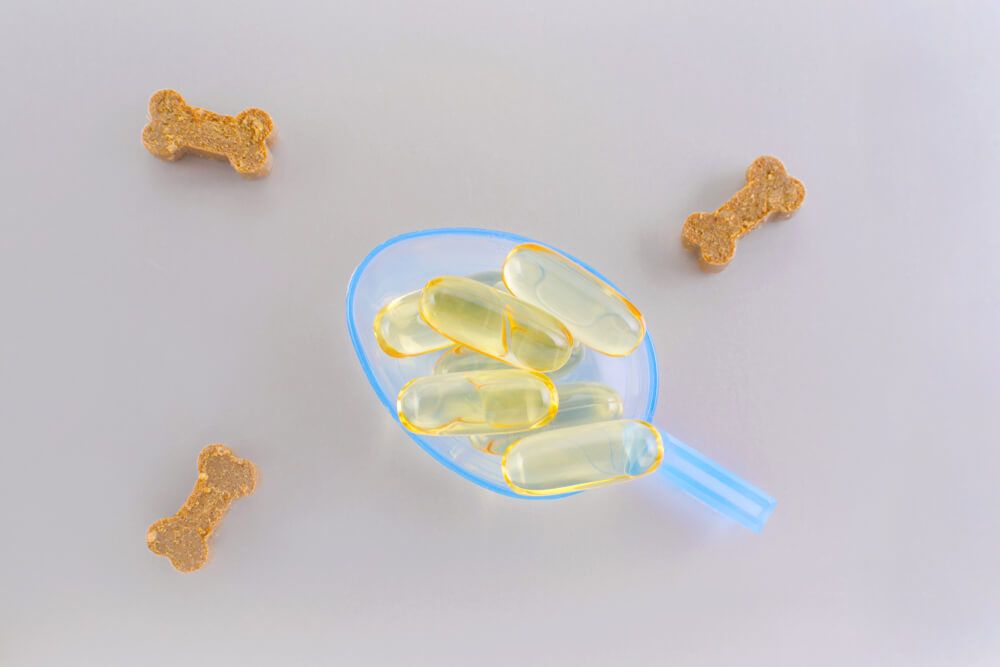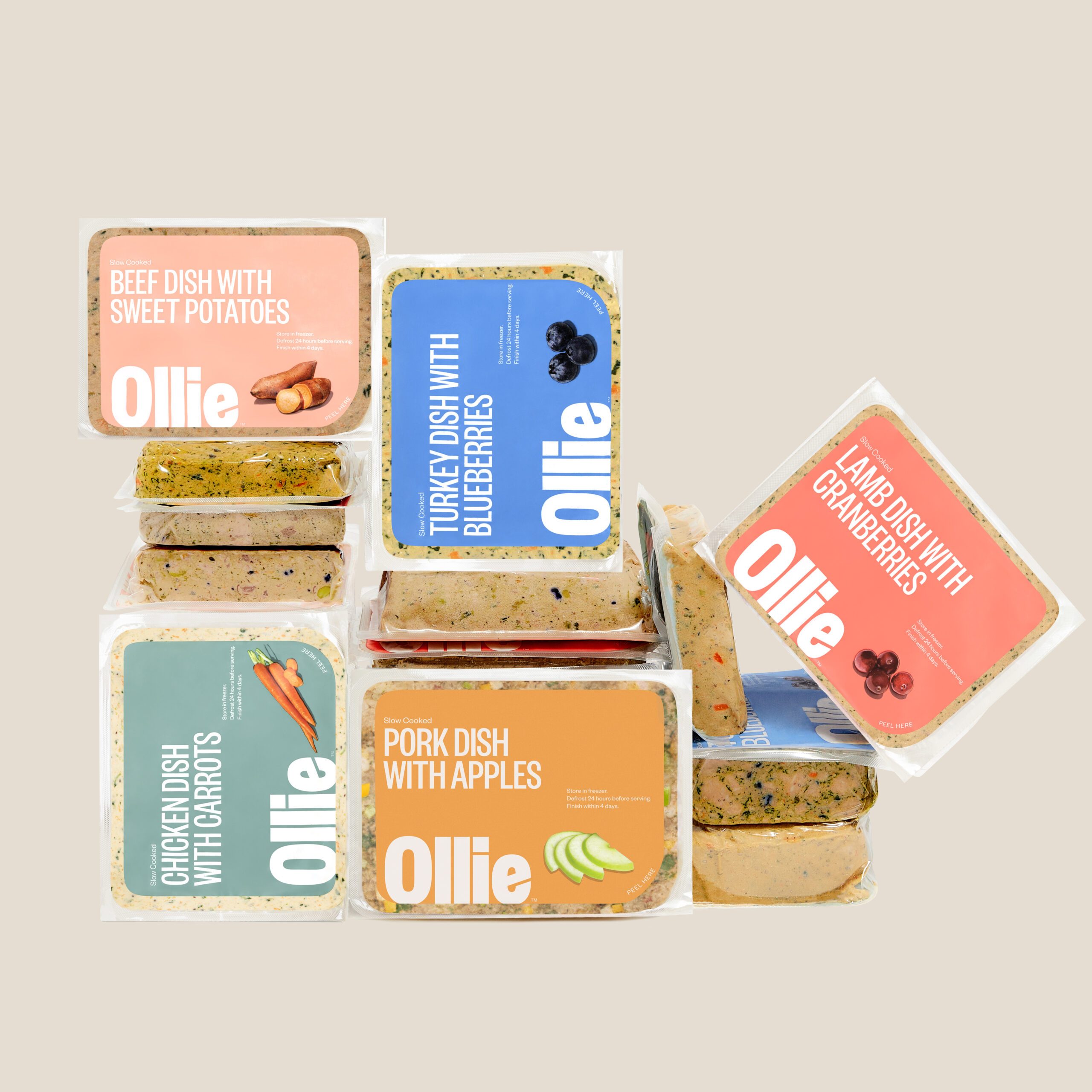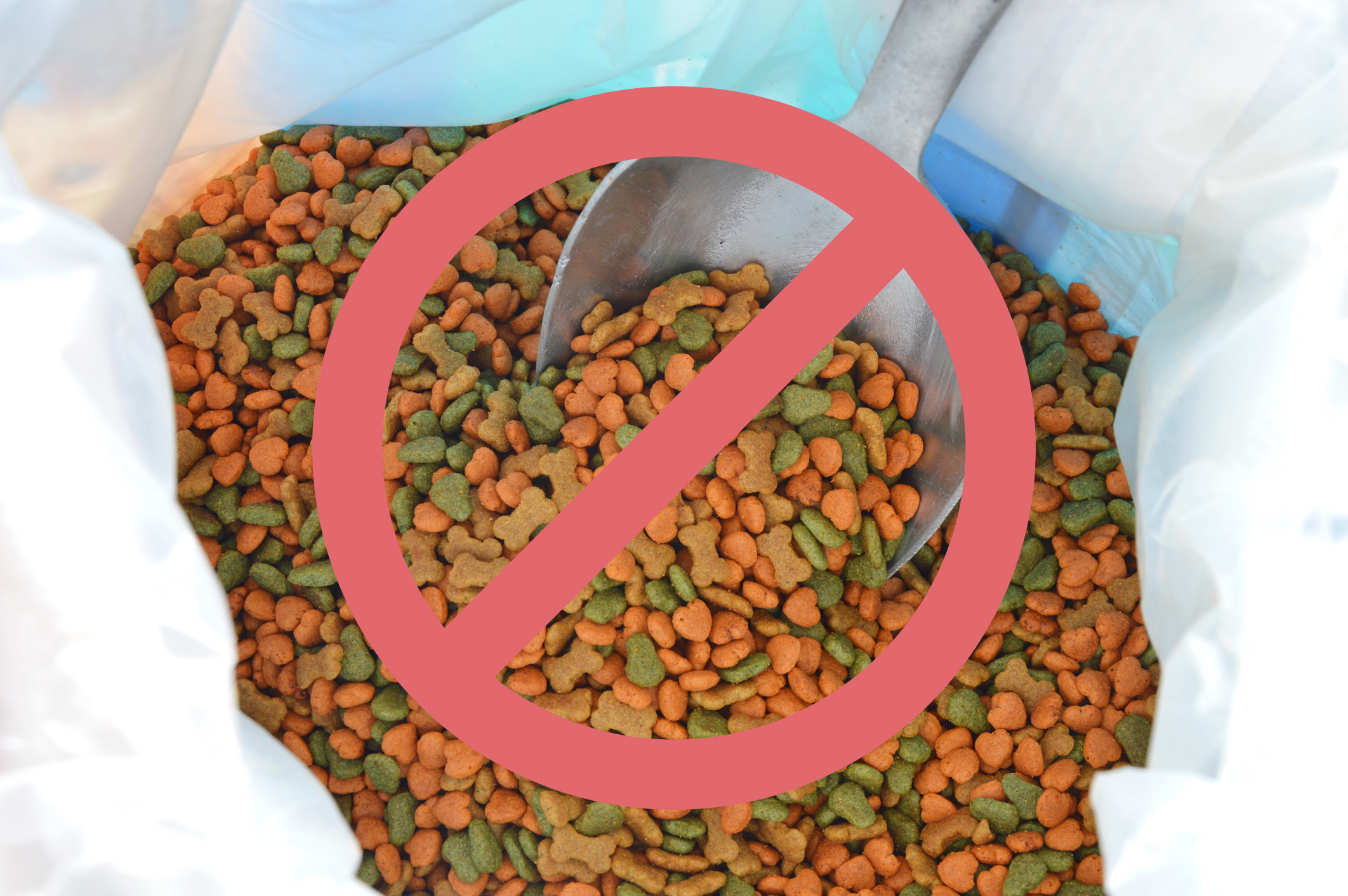Hey Ollie blog readers! We’re offering you an exclusive 60% OFF your starter box! Try now!
Searching for “supplements for dogs” can overwhelm you with options claiming to enhance your dog’s skin, joints, heart health, and overall well-being. But are these supplements necessary or effective? We’ve consulted experts to determine whether supplemental support truly benefits your dog’s health, mobility, and longevity.
What Are Dietary Supplements for Dogs?
The Association of American Feed Control Officials (AAFCO) defines a supplement as: “A feed used with [sic] in conjunction with another feed to improve the nutritive balance or performance of the total feed, and intended to be fed undiluted as an addition to other feeds.” Or, in the case of base mixes (i.e., vitamin and mineral combinations intended to balance homemade diets), “further diluted to produce a complete feed.”
According to pet supplement sales data, dog and cat owners are eating up the idea of enhancing their pet’s health with dietary supplements. In April 2019, the pet supplement industry was valued at approximately $636 million, according to market research publisher Packaged Facts, and most could be attributed to dog owner spending. Pet supplements have been steady, sometimes outstanding, pet market performers for more than a decade. They have maintained momentum thanks to the pet market’s driving focus on health and wellness, age and obesity-related health conditions, nutrition’s role in a dog’s preventive health and wellness routine, and functional ingredients and products targeting specific health conditions.

Types of Supplements for Dogs
Joint Supplements
These supplements often contain glucosamine and chondroitin, which are naturally found in the fluid around joints and help build cartilage. They are used to treat arthritis in dogs, relieve joint pain, and improve mobility.
You should look for the following ingredients in a joint supplement for your dog.
Glucosamine
Glucosamine is a cartilage-building amino sugar found in the fluid surrounding your pet’s joints. Glucosamine is a well-known joint supplement for dogs that veterinarians frequently recommend for arthritis-related pain and stiffness, because they believe supplemental glucosamine can help reduce joint pain and support healthy mobility in senior dogs. A 2007 study in The Veterinary Journal demonstrated that glucosamine supplements reduced pain and increased mobility after 70 days of treatment but, with that exception, clinical research validating glucosamine’s effectiveness for joint health is limited.
Glucosamine
Glucosamine is a cartilage-building amino sugar found in the fluid surrounding your pet’s joints. Glucosamine is a well-known joint supplement for dogs that veterinarians frequently recommend for arthritis-related pain and stiffness, because they believe supplemental glucosamine can help reduce joint pain and support healthy mobility in senior dogs. A 2007 study in The Veterinary Journal demonstrated that glucosamine supplements reduced pain and increased mobility after 70 days of treatment but, with that exception, clinical research validating glucosamine’s effectiveness for joint health is limited.
Glucosamine for Dogs: Benefits & Risks.
MSM (methylsulfonylmethane)
Methylsulfonylmethane (MSM) is crucial for joint health in dogs due to its anti-inflammatory properties that reduce joint pain and swelling. It supports cartilage health by providing sulfur, enhances the effectiveness of other joint supplements like glucosamine and chondroitin, and offers antioxidant benefits that minimize oxidative stress in joint cells. Incorporating MSM into your dog’s diet can improve their mobility and quality of life, especially for those with joint issues. Always consult a veterinarian before adding new supplements to your dog’s regimen.
Omega Fatty Acids
Omega fatty acids, particularly EPA (eicosapentaenoic acid) and DHA (docosahexaenoic acid), play a crucial role in maintaining joint health in dogs. These fatty acids, found in fish oil and other marine sources, have potent anti-inflammatory properties that help reduce joint inflammation and pain associated with conditions like arthritis.
By decreasing inflammation, EPA and DHA can help preserve cartilage health, slowing the progression of joint deterioration and improving overall joint function. Additionally, omega fatty acids contribute to the lubrication of the joints, enhancing mobility and comfort for dogs during movement. Regular supplementation with EPA and DHA can significantly improve the quality of life for dogs with joint issues, supporting their active and healthy lifestyle.
Joint Health for Dogs: Keep Your Dog Health at Any Age
Skin & Coat Health Supplements
Fish oil
Fish oil contains omega-3 fatty acids, a natural anti-inflammatory compound that can improve your dog’s skin and coat, relieve irritating allergies, and ease chronic inflammatory conditions, such as arthritis. Omega-3 fatty acids are also recommended for pets suffering from, or at-risk for, various heart conditions. However, high fish oil doses can negatively affect your dog with problems that include digestive upset, diarrhea, and pancreatitis, so always consult your veterinarian before adding fish oil to your dog’s diet.
Vitamin E
Vitamin E is a fat-soluble antioxidant and a natural anti-inflammatory that helps your dog’s body fight harmful free radicals and oxidative stress, which can lead to chronic diseases and cancer. Vitamin E’s anti-inflammatory properties support your dog’s skin and coat by controlling allergic irritation. Fortunately, most prepared dog foods contain appropriate vitamin E levels. Ask your veterinarian before supplementing your dog’s vitamin E intake.
Digestive Health Supplements
Probiotics live naturally in a dog’s digestive system and aid with good digestion. As supplements, they can help treat diarrhea and other digestive problems.
Probiotics
Probiotics (i.e., beneficial bacteria) are now popular human dietary supplements, so it’s no surprise that they’ve found their way to our four-legged friends. Probiotics are typically fed to your pet to improve their gut microbiome and support intestinal health, and sometimes to treat diarrhea. Probiotics are available in many forms, including yogurt, pills, and powders, and are included in some dog food formulas.
Fiber
Dogs with certain digestive conditions may benefit from supplemental fiber. Fiber helps regulate digestive motility by slowing nutrient absorption as food moves through the intestines and promotes regularity by adding bulk to the stool. Fiber can also help promote weight loss by helping dogs feel fuller longer, support blood sugar regulation in diabetic dogs, and promote natural anal sac expression for dogs suffering from frequent impaction or irritation. However, excessive fiber can lead to unpleasant consequences, including bloating, constipation, and diarrhea, so consult your veterinarian before adding fiber to your dog’s diet.
Other Helpful Ingredients
Hemp and CBD
The human hemp and cannabidiol (CBD) craze has reached your dog’s food bowl. But, don’t worry—CBD contains none of marijuana’s addictive or mind-altering properties. CBD for Dogs has relaxing and pain-relieving effects for problems from anxiety and allergies, to cancer support. CBD and hemp-containing products include chews, treats, peanut butter, and CBD-infused honey.
Milk thistle
Milk thistle has been shown to safely and effectively treat a number of liver conditions. Specifically, milk thistle can protect the liver against toxins, stimulate new liver cell growth, and act as a potent anti-inflammatory. Most dogs tolerate milk thistle well, but high doses can lead to upset stomach, gas, and mild diarrhea, which reducing the dosage can remedy.

In most cases, probably not. Despite the marketing hype, AAFCO says, “Generally speaking, healthy dogs and cats that are fed a complete and balanced diet appropriate for their life stage do not [need supplements].” However, the organization concedes that “Veterinarians sometimes prescribe special ‘supplements’ or ‘therapeutic diets’ for pets with certain disease conditions.”
At Ollie, we know plenty about creating a balanced diet. Our recipes are designed to ensure your pup has everything they need in each personalized portion. We work closely with veterinary nutritionists and source only the highest quality human-grade ingredients that will keep your dog nourished and healthy. Their personalized meal plan is then tailored to their exact needs, based on their breed, life stage, weight, and activity level.
10 Signs That You Need to Take Your Pet to the Vet STAT
Although supplements—especially those labeled natural or plant-based—may seem safer than traditional pharmaceutical drugs, supplements are not risk-free and should never be fed to your pet without veterinary approval. Unauthorized supplements and dosages can interact with your dog’s current medications, mask serious underlying health issues, create a false sense of security, and cause more problems than they solve.
How to Choose a Dog Supplement
- Work Closely With Your Vet: If you think dietary supplements would benefit your dog, work closely with your veterinarian to ensure an accurate diagnosis and to develop a targeted treatment plan. Your veterinarian may need to monitor your pup’s condition with periodic blood tests and exams to stay informed about their ongoing treatment plan and supplement dosage.
- Choose a Well Known Brand: If your veterinarian doesn’t recommend a name-brand supplement, you likely will be overwhelmed by the many choices. Look for a well-known brand with a good industry reputation.
- Look for NASC Quality Seal: The National Animal Supplement Council (NASC) Quality Seal, which indicates compliance with rigorous third-party testing and strict quality standards, makes this easy.
- Use Pet-Safe Supplements: Give your dog supplements labeled for pet use. Human-use products, despite the same name and primary ingredient, may contain unsafe doses or pet-toxic ingredients such as xylitol.
- Avoid Harmful Ingredients: Look closely at the product’s ingredients. Like dog food, supplements can contain cheap fillers and harmful or unnecessary additives that aren’t always included on the label. ContactCall the manufacturer to ensure your pet’s supplement doesn’t contain these ingredients:
- Corn syrup, sucrose, and sorbitol
- Artificial colors or flavors
- Monosodium glutamate (MSG)
- Silicon dioxide
- Polyethylene glycol
- Parabens
- Genetically modified organisms (GMOs)
- Carrageenan
- Resins
- Butylated hydroxyanisole (BHA) and butylated hydroxytoluene (BHT)
If you’re concerned you may not choose a safe, high-quality supplement, ask your veterinarian for brand or manufacturer recommendations.
While many high-quality supplements are designed to improve your dog’s quality of life, others prey on your desire to ensure your dog receives nothing but the best. If confusing supplement labels and advertisements trigger uncertainty, remember—a complete and balanced dog food such as Ollie provides everything a healthy dog needs.


Which recipe plan is right for your dog’s needs?
Get 60% of your first box of Ollie’s fresh
delivered meals today!
Tagged As:

The nutrition your dog needs,
the food they want.

Enjoying our articles? Subscribe our Newsletters and get new articles directly to your inbox
You might also like
14 July 2025
5 MINS READ
Ingredients to Avoid When Choosing Your Dog’s Food
Navigating the world of dog food can be overwhelming, with endless options and confusing ingredient lists. Understanding which ingredients to avoid is just as important as knowing which ones to se…
by Ollie Pets
14 July 2025
6 MINS READ
Top Choices for the Healthiest Dog Food Today
As dedicated dog parents, we always want to give our dogs the best. However, when it comes to mealtimes, it can be difficult to know what actually makes some options better than others, especially…
by Ollie Pets
14 July 2025
5 MINS READ
Understanding Limited Ingredient Diets for Dogs
As a dog parent, seeing your pup struggle with itchy skin, an upset stomach, or persistent ear infections is always stressful. Limited ingredient dog food has become a popular choice for pup paren…
by Ollie Pets







